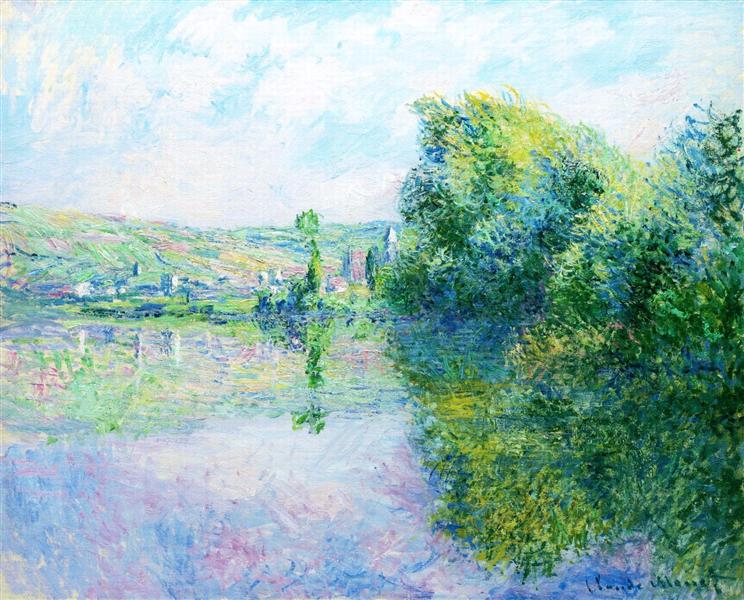Tanım
The work “La Siene at Vetheuil”, painted by Claude Monet in 1880, sits majestically in the Impressionist tradition that the artist helped define. Capturing a view of the River Seine in the small town of Vetheuil, this work reflects both Monet’s interest in light and colour and his emotional connection to the landscape that surrounded him. Vetheuil was not only a significant place for Monet from an artistic perspective, but also a personal one; he spent various periods of his life there, and the nature that surrounded him repeatedly inspired his work.
In this painting, Monet uses a soft, warm palette that evokes a calm, contemplative atmosphere. The blue hues of the Seine's water contrast with the greens and ochres of the shore, and the quick, loose brushstrokes suggest movement of both the water and the breeze. This dynamism is a hallmark of the Impressionist style, where the fleeting capture of light reflects a transience that brings the scene to life.
The composition is arranged in such a way that it invites the eye to travel along the river. The horizon is kept low, with an overwhelmingly present sky occupying the top of the canvas, dotted with clouds that seem to dissolve into thin air. The line of the river meanders through the painting, guiding the viewer towards the background, where a group of trees and buildings loom from the distance. These elements create a sense of depth and perspective, a master characteristic of Monet’s approach.
As for the human presence, there are no central figures that draw attention in this work; however, a closeness to the people is perceived through the representation of the outdoor lifestyle and the exploration of the natural environment. The absence of human protagonists allows nature and the landscape to become the true protagonists of the work, highlighting the idea that the relationship between humans and their natural environment is intrinsic and harmonious.
A fascinating aspect of La Siene at Vetheuil is the way in which Monet manages to evoke a sense of time and place through his choice of technique. The brushstrokes that capture sunlight on water are particularly notable, a practice that Monet honed throughout his career, and which can be seen in other works such as Impression, Rising Sun or The Water Lilies. This ability to capture the ephemeral essence of light reveals not only his technical mastery, but also his deep understanding of the changing nature of the landscape.
In conclusion, “La Siene at Vetheuil” is a work that encapsulates not only Monet’s impressionistic style, but also reflects his dedication to exploring the subtleties of the natural environment. Through a careful combination of color, form, and light, Monet transports us to a moment of serenity, reminding us of the inherent beauty of the landscapes around us, while exploring the relationship between man and nature without the need for an explicit narrative. The work stands not only as a testament to Monet’s skill as a painter, but also as a reminder of the evocative power of the landscape.
KUADROS ©, a famous painting on your wall.
Hand-made oil painting reproductions, with the quality of professional artists and the distinctive seal of KUADROS ©.
Painting reproduction service with satisfaction guarantee. If you are not completely satisfied with the replica of your painting, we will refund 100% of your money.

